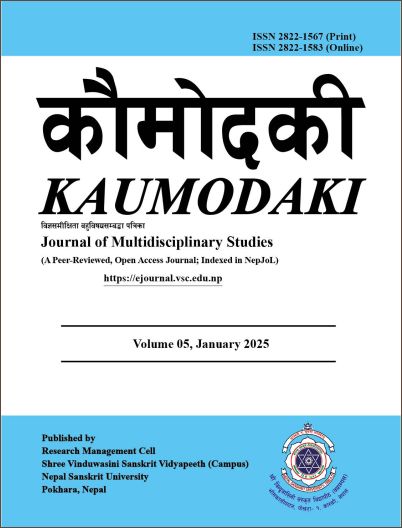Messianic Power in Walcott’s The Dream on Monkey Mountain
DOI:
https://doi.org/10.3126/kdk.v5i1.73645Keywords:
Colonized, colonizers, intercultural, power, restoreAbstract
This paper explores messianic power in Derek Walcott’s The Dream on Monkey Mountain (1970), through the philosophical concept of history. In the play, Makak, the protagonist, dreams of a white Goddess figure, and believes he is a redeemer of his race. His claim reminds the narrative of Moses and the Jews. At the same time, the performance of a self-proclaimed Messiah in a drunken frenzy surprises the audience. Makak’s impression and his belief sound contradictory. This study applies Walter Benjamin’s philosophical concept of history and Michel Foucault’s concept of power as a framework for qualitative applied research. The focus lies on Benjamin’s idea of ‘historical materialism’ and the urgency of a ‘messianic power’ to rewrite history. Therefore, Makak’s claim restores the Black culture of the Caribbean island because he possesses messianic power when he dreams of a white Goddess figure. Makak’s imagination of a white Goddess figure represents the folklore of Africa. The shimmering Goddess figure confers divine power to Makak to defend against European colonizers. Later, he identifies himself with African culture and liberates Blacks from years of oppression. Makak’s dream aims to break the cycle of colonization on the Caribbean island. Black culture and identity became a new discourse of Caribbean islands in the 20th century.
Downloads
Downloads
Published
How to Cite
Issue
Section
License

This work is licensed under a Creative Commons Attribution-NonCommercial 4.0 International License.
This license enables reusers to distribute, remix, adapt, and build upon the material in any medium or format for noncommercial purposes only, and only so long as attribution is given to the creator.




